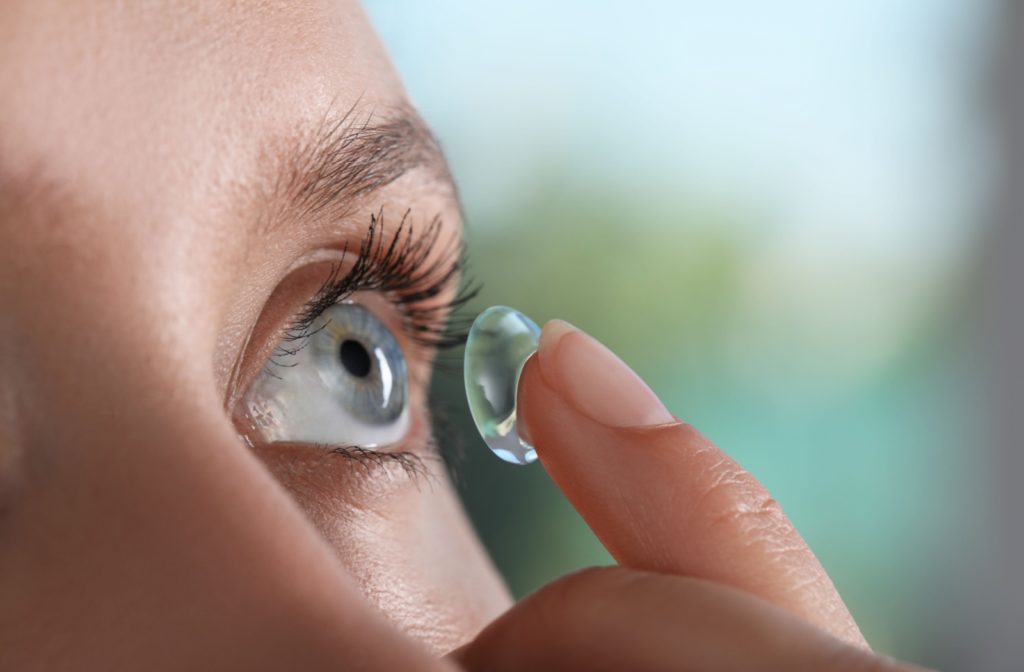Contacts are a popular choice for sports, outdoor activities, or everyday wear, offering a natural range of vision without frames getting in the way. But before making the switch, it’s essential to understand that contact lenses require a different prescription than glasses.
While both correct your vision, each requires specific measurements that differ due to how the lenses sit on your eyes. Glasses rest slightly away from your eyes, whereas contact lenses fit directly on the eye’s surface.
Glasses vs. Contact Lens
Though glasses and contacts both help sharpen your vision, they’re not interchangeable in how they correct it. Prescriptions for each are based on specific details of the lenses and how they interact with your eyes. A glasses prescription, for example, can’t be converted directly into a contact lens prescription without a professional fitting.
Unlike glasses, which sit a short distance away, contact lenses rest directly on your eye. This difference in distance affects how the lenses are crafted and requires your optometrist to measure additional factors like your eye’s curvature (base curve) and lens diameter. These help your lenses fit comfortably and provide clear vision without shifting or irritating your eyes.
Can You Use Your Glasses Prescription for Contacts?
In short, no. Glasses and contact lenses are crafted differently, and a contact lens prescription involves precise measurements to give you a set that fits comfortably on your eye. While both prescriptions specify the strength you need to see clearly, contacts require additional specifications:
- Base curve (BC): Matches the curve of your eye to prevent movement
- Diameter (DIA): So the lens fits the shape of your eye comfortably
- Lens material: Some lenses allow more oxygen to reach your eye, helping with comfort
- Expiration date: Contact prescriptions usually last a year
These details help make contacts that will sit securely on your eyes, offering the sharp vision you’re used to with glasses without the hassle of frequent adjustments.

Pros & Cons of Glasses & Contact Lenses
When choosing between glasses and contact lenses, it’s helpful to consider the benefits and limitations of each option to find what suits your lifestyle best.
Glasses
Glasses are a convenient choice for many—quick to put on and easy to care for. They allow you to express your style with different frames and lenses, and if your prescription doesn’t change, they can last a long time without needing replacements.
However, glasses can be impacted by weather conditions like rain or fog, and strong prescriptions can sometimes make the lenses thicker, which may slightly distort vision around the edges. They can also be less practical for activities where they might slip or fall, such as sports.
Contact Lenses
Contact lenses, meanwhile, offer a more natural field of vision by moving with your eyes, providing an uninterrupted view without any frames. They’re especially useful for sports or outdoor activities, as they stay in place and won’t fog up in different weather conditions.
On the downside, contact lenses require more daily care, including cleaning, storage, and proper handling to avoid complications. Getting used to contacts can also take some time, but once you do, they can provide clear, unobstructed vision.
Ultimately, deciding between glasses and contact lenses depends on your personal needs and daily activities. If you’re interested in trying contacts, a contact lens exam can help your optometrist determine the best lenses for your unique vision needs.
What to Expect from a Contact Lens Fitting
If you’re new to contact lenses, expect your optometrist to take extra steps during the exam. They’ll evaluate your cornea’s curvature and pupil size, ask questions about your lifestyle, and recommend different options that work for you.
A contact lens fitting isn’t just about vision correction; it’s also about comfort. With the right lenses, you can enjoy clear vision without the barriers glasses can sometimes bring.
Ready to Switch? Book a Contact Lens Exam Today
Making the move to contact lenses can open up a world of convenience, comfort, and flexibility. Our team at Dr. Henslick Vision Center is committed to making sure that every step of your transition is smooth and tailored to your unique needs. Our comprehensive contact lens exams go beyond just measuring your prescription; we take the time to assess your lifestyle, preferences, and comfort. Book an appointment today, and let us guide you to better, more comfortable vision solutions.




